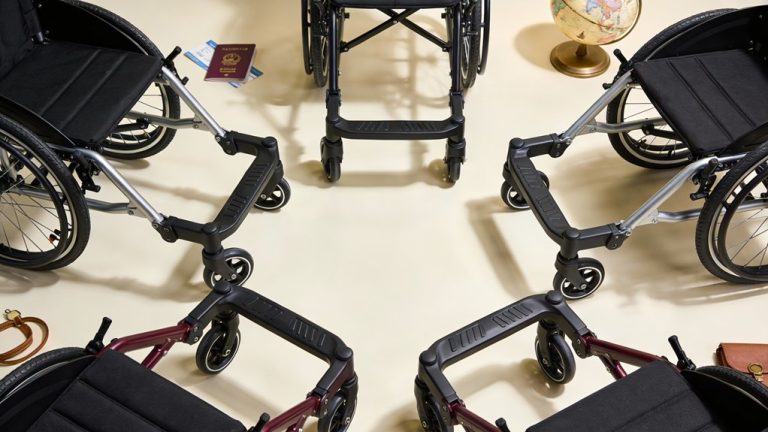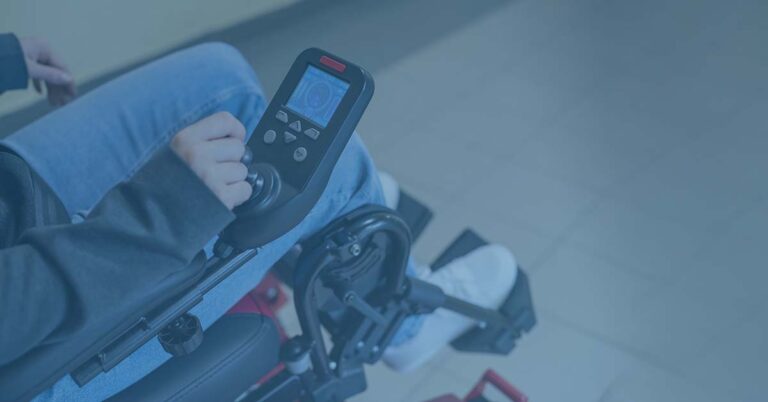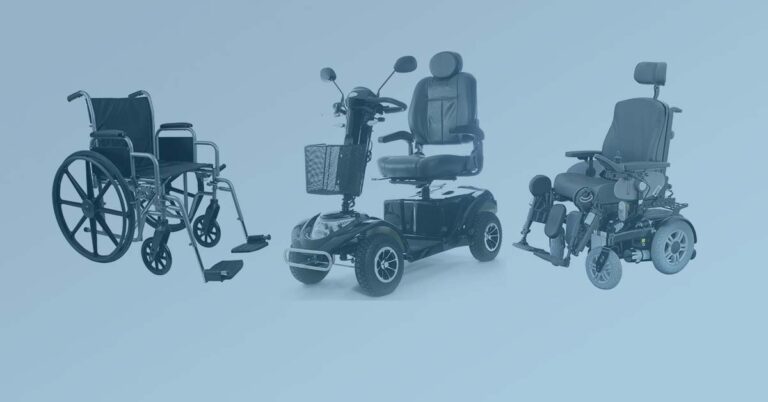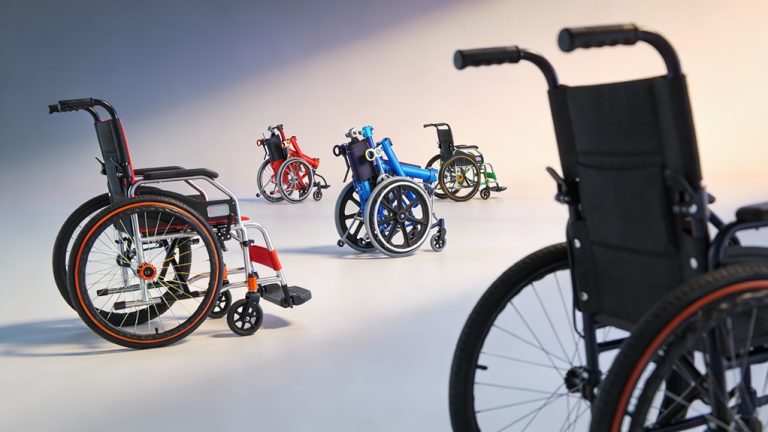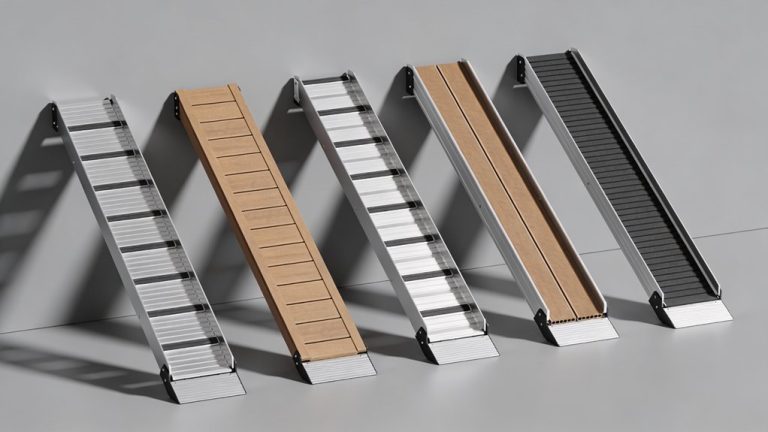How to Get a Free Wheelchair for Senior? [8 Ways]
When you live on a tight budget, you may have trouble finding mobility products such as wheelchairs. But what about a FREE wheelchair?
Manual wheelchairs can cost up to $1500 (A HEFTY SUM!).
Many of our most vulnerable are finding themselves priced out of the market at those prices.
Fortunately, some organizations are stepping up. They supply free or reduced-cost wheelchairs for seniors and the disabled to help them continue to lead active healthy lives.
Let’s take a look at several of these organizations and their qualification requirements. Hope this helps you can find a free wheelchair for yourself or someone you know.
1) Can You Get a Free Wheelchair From Medicare?
Medicare is a federal health insurance program for Americans over 65. The coverage is also available for some younger people with severe disabilities or end-stage renal disease.
Wheelchair Requirements Under Medicare
Medicare Part B covers wheelchairs with these requirements:
- First, the doctor treating your condition must submit a written order stating the MEDICAL NEED for an assistive mobility device and your ability to operate the chair safely.
- Once approved, and after meeting your annual deductible, you would pay 20% of the Medicare-approved amount. Medicare would pick up the other 80%.
- These amounts may differ slightly for Medicare Advantage recipients, so it’s best to contact your plan directly.
Medicare has different parts covering hospital stays, doctor’s appointments, home health care, and prescription drugs.
Most recipients will not pay a premium for Medicare Part A because they could fund this future need while paying Medicare taxes through their employer.
Part A is the part of Medicare that helps cover hospital stays, home health care, and hospice stays.
Medicare Part B has a standard premium amount for most people, and the cost is adjusted each year.
Part B coverage includes doctor’s visits, preventative services, and outpatient care. In addition, Medicare Part B includes provisions for durable medical equipment.
For those with Original Medicare, wheelchairs would fall under their Part B coverage for durable medical equipment.
Recipients can subscribe to individual parts directly with Medicare or sign up with a private insurer for a Medicare Advantage program. That combines all of the Medicare “parts” with one company, allowing them to use one source for their medical care needs.
While covered under a Medicare Advantage program with a private insurer, the company must still abide by Medicare’s rules.
2) Does Medicaid Pay for a Wheelchair?
Medicaid is a joint venture between the federal and state governments. The purpose of Medicaid is to assist with healthcare costs for people with limited income and resources.
Wheelchair Qualification Under Medicaid
A physician must CERTIFY that the individual cannot manage activities of daily living at home without a wheelchair.
But there are slightly different qualifications for wheelchairs in each state (similar to Medicare)
If the individual cannot use a manual wheelchair, Medicaid will cover the cost of a power wheelchair.
To find out what you qualify for, contact your state’s Medicaid office.
Medicaid operates under the same umbrella as Medicare but with a different focus. One program is designed for people 65 or older, while the other is for limited economic resources.
Qualification requirements for Medicaid VARY BY STATE. Federal law requires states to include coverage for certain groups in the state’s Medicaid program.
Groups like low-income families, individuals receiving Supplemental Security Income, and eligible pregnant women and children are all examples of these groups.
3) The Wheelchair Foundation
The Wheelchair Foundation is a non-profit corporation based in Danville, CA.
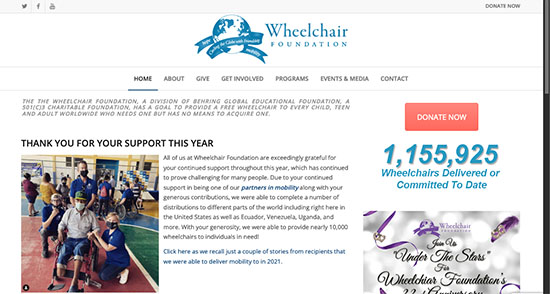
The company was founded in June 2000. It partners with donors to provide wheelchairs for people who need them but cannot afford to pay for them.
In 2021 they donated almost 10000 wheelchairs to people across the globe despite the pandemic.
Most of their work focuses on landmine victims in war-torn countries.
They partner with some U.S.-based charities for wheelchair distribution in this country (the Salvation Army, Goodwill Industries, Catholic Charities, and other relief organizations).
Do you know how many people worldwide need wheelchairs but cannot afford them? It is estimated that at least 100 million.
4) LifeNets Wheelchair Project
The LifeNets Wheelchair Project has been in business since 1999. It works to match donated wheelchairs with people who need them and cannot afford them.
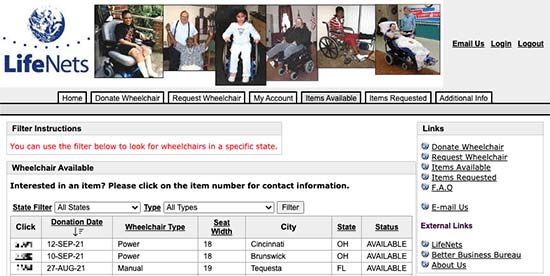
You can fill out the application form and create an account on their website to get added to the list.
You can browse through available complimentary wheelchairs state by state on the site. To view details of the items, you need to have an account.
LifeNets has many civic-minded projects worldwide, including a scholarship program and a habitat program for residents of impoverished nations.
5) American Outreach Foundation
The American Outreach Foundation has been around since 2007. They assist veterans, low-income households, and the elderly.
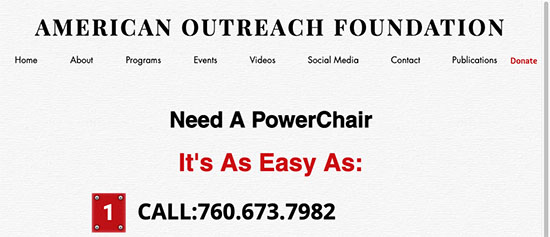
The American Outreach Foundation collects power wheelchair and scooter donations. It then distributes them to others in need.
Qualification requirements include:
- a wheelchair prescription from your doctor,
- DENIAL from your health insurance company, and
- evidence of a financial need, including proof of annual income.
6) Muscular Dystrophy Association
The Muscular Dystrophy Association has been around since 1950. It is committed to improving the lives of children and adults suffering from neuromuscular diseases and disorders.
The MDA has a worldwide outreach that’s made a positive difference in people’s lives for over 70 years.
To find your nearest office go to mda.org and click on Care and Services and MDA Care Centers. You can find the list of Care Centers state by state.
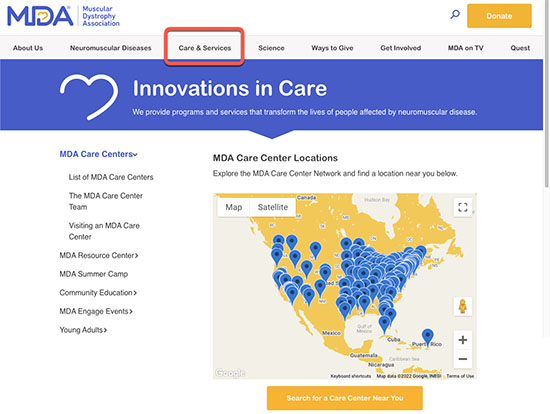
Local offices of the MDA accept donations of manual and power wheelchairs along with hospital beds, lift chairs, and walkers.
These donated items are refurbished and provided to members in need in the local community.
7) Your Health Insurance Company
As durable medical equipment, wheelchairs are COVERED by most private insurance plans, but not all.
Be sure to check with your insurance company to see where you stand on coverage and the procedure for getting your wheelchair approved.
8) Local Churches and Civic Organizations
Many communities have wheelchair programs through churches or other non-profit organizations.
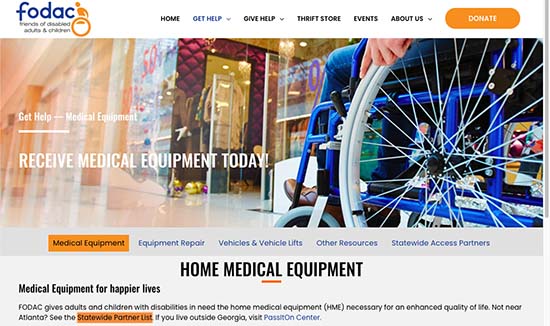
They assist individuals in getting the medical equipment and supplies they need at little to no cost.
A quick check around your local area might provide just what you need.
Make Sure Your Living Quarters Are Accessible
Check your living quarters BEFORE receiving a wheelchair.
Consider things like:
- Ramps for wheelchairs
- Wider entrances and hallways
- The right height for sinks and countertops
- A roll-in shower with grab bars
- Stairlifts
- Car lifts and carriers
Wrap Up
Mobility is essential to having a healthy quality of life. Our society benefits when wheelchairs and other mobility devices are available to the people who need them most to help them lead active lives.
By providing free wheelchairs for seniors and anyone else who needs one, these organizations give individuals back their self-autonomy and make their world a little bit brighter.
If you can’t FIT these qualification requirements and are still hunting for an affordable wheelchair, a used wheelchair is an affordable option.
Check this article if your needs are different and you are interested in getting a mobility scooter through Medicare or Medicaid instead of a wheelchair.
And if you already have a wheelchair and want to give hope through the gift of a wheelchair, read this article on donating your used wheelchair.


